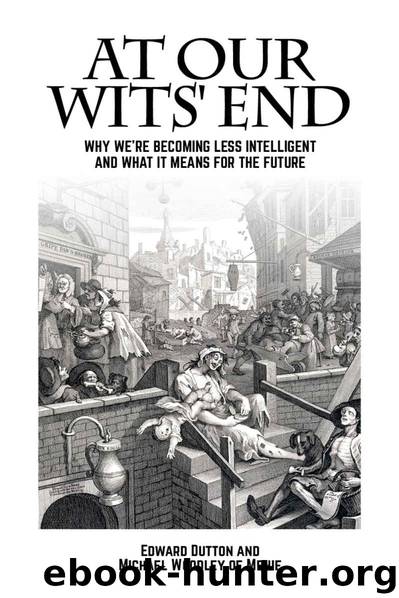At Our Wits' End by Edward Dutton

Author:Edward Dutton [Dutton, Edward]
Language: eng
Format: epub
Tags: Science, normal distribution, Civilization, Evolution, Intelligence, society, IQ, genes, statistics, Darwinian selection, Woodley effect, Flynn effect, Darwin, general intelligence, Industrial Revolution, bell curve, personality, genetics, genius
ISBN: 9781908684264
Publisher: Societas
Published: 2018-12-20T07:00:00+00:00
Feminism
Another important contributory factor to the negative association between intelligence and fertility in industrial societies has been the rise of feminism and, in particular, the opening up of the professions to women, a point also raised by Richard Lynn. In the first half of the 19th century, routine discrimination meant that very few jobs were open to women at all. Women might be maid-servants, cooks, laundresses, cleaners, seamstresses, or factory workers of certain kinds. However, jobs such as teaching or nursing, which were relatively skilled, had to be abandoned if the woman got married. Obviously, professions such as medicine and law weren’t open to women. This began to change in the second half of the 19th century and accelerated after World War I, during which many women did the assorted jobs that men couldn’t do because they were away fighting. The percentage of women who worked increased dramatically not just in terms of women working in factories and the like but also in terms of women in the professions, such as teaching, medicine, and law.
This has led to a situation where most women now work, even if many give up work for significant periods when they become mothers. The more intelligent women will go to university and then enter one of the professions. By doing so, they will delay motherhood, often into at least their late twenties and, sometimes, significantly beyond that. They spend most of their twenties and maybe even the first half of their thirties concentrating on their careers. The result is that for purely biological reasons they can expect to have a relatively small number of children, as fertility declines with age and does so very rapidly from around 35 onwards.[59] And, indeed, they may find that they have left it too late and they cannot have children at all.
By contrast, we can expect that less intelligent women will be less likely to delay their fertility. Herrnstein and Murray have shown that in the USA, on the NLSY, the percentage married before the age of 30 decreases as IQ increases. Among those with an IQ classed as ‘dull’, 81% who had got married had done so before the age of 30 and the average age at marriage was 21.3. Among those classed as ‘very bright’, only 67% had married before the age of 30 and the average age at marriage was 25.4.[60] For these reasons, the entry of women into the professions can be seen as a contributory factor to the negative relationship between intelligence and fertility. More intelligent women will be more able to go to university, more willing to go to university, and more interested in their careers. So, when they have the options of becoming a professional—and so delaying or completely abandoning motherhood—they are more likely and more able to take it. Indeed, this may explain why, among younger cohorts, the negative relationship between intelligence and fertility is actually becoming stronger in some countries. It weakened as knowledge of contraception spread down the social
Download
This site does not store any files on its server. We only index and link to content provided by other sites. Please contact the content providers to delete copyright contents if any and email us, we'll remove relevant links or contents immediately.
| Fossils | Game Theory |
| Genetics | Molecular Biology |
| Organic | Paleontology |
Sapiens: A Brief History of Humankind by Yuval Noah Harari(13036)
Sapiens by Yuval Noah Harari(4528)
Homo Deus: A Brief History of Tomorrow by Yuval Noah Harari(4272)
Pale Blue Dot by Carl Sagan(3995)
Origin Story: A Big History of Everything by David Christian(3133)
Livewired by David Eagleman(3113)
Brief Answers to the Big Questions by Stephen Hawking(2872)
Inferior by Angela Saini(2829)
Origin Story by David Christian(2677)
The Evolution of Beauty by Richard O. Prum(2550)
Signature in the Cell: DNA and the Evidence for Intelligent Design by Stephen C. Meyer(2495)
The Gene: An Intimate History by Siddhartha Mukherjee(2487)
Aliens by Jim Al-Khalili(2376)
How The Mind Works by Steven Pinker(2206)
Sex at Dawn: The Prehistoric Origins of Modern Sexuality by Ryan Christopher(2148)
From Bacteria to Bach and Back by Daniel C. Dennett(2145)
A Short History of Nearly Everything by Bryson Bill(2131)
Endless Forms Most Beautiful by Sean B. Carroll(2079)
Who We Are and How We Got Here by David Reich(2057)
